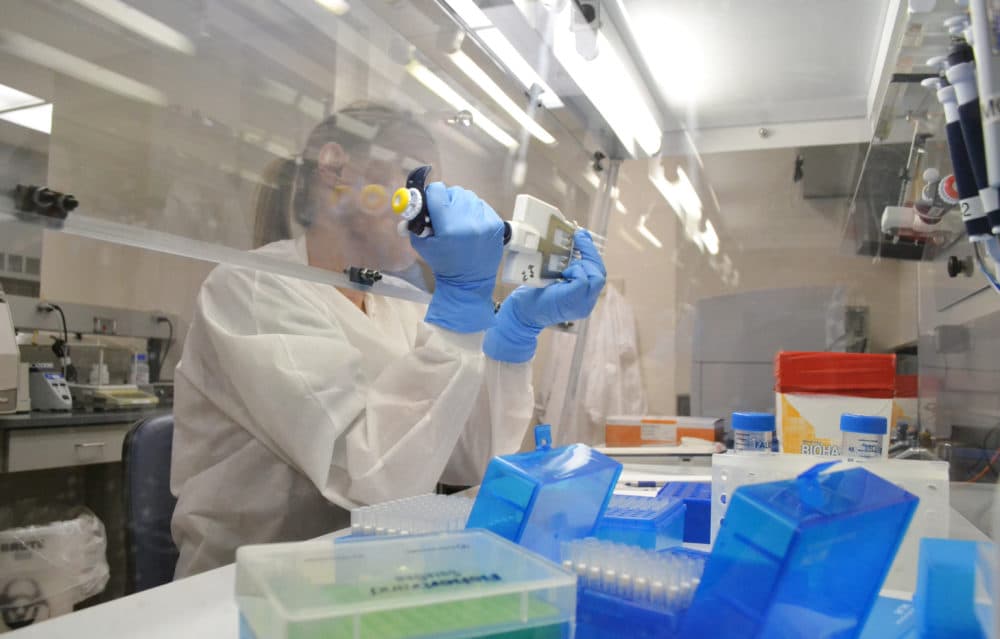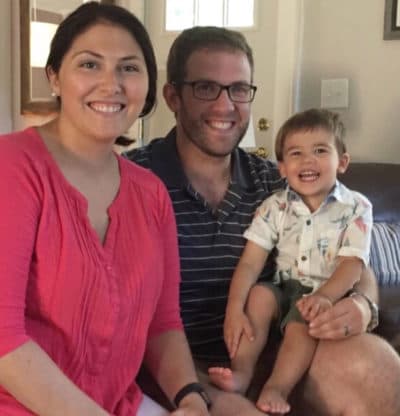Advertisement
Would You Check Your Baby's DNA For Free? Most Parents In Boston Study Say 'No, Thanks'
Resume
The day after Katherine Martucci gave birth at Brigham and Women's Hospital just over two years ago, she and her husband, Andrew, were asked if they'd consider enrolling their new baby in a study.
Baby Benjamin's DNA could be sequenced — hundreds of his genes analyzed in a process that could normally cost up to $5,000 — for free. The results would be included in his medical record. And if anything turned up that augured trouble — a gene for early colon cancer, say, or muscular dystrophy — they and Ben's doctors would be warned, and might be able to take action.

Katherine recalls struggling to stay awake after a night up with her newborn as a geneticist explained the potential pros and cons. But she had been working at the hospital managing construction of a major new research building, and it seemed like "a no-brainer" to join the study.
Andrew, a construction superintendent, felt the same way: "If they could give us information that could help us, and help Ben, and also help further the research study — I think it was just kind of a win-win," he says. "I'm always of the mind that I'd rather know, even if it's bad news, than to be in the dark about something, because if you know about it, you can at least take steps to help make it better."
The study, called BabySeq, ran for four years and is now beginning to publish its findings. One of its first, out this week in the journal Genetics In Medicine: Ben's parents' willingness to have his DNA analyzed is looking very much like the exception, not the rule.
Of the first 3,800 families of newborns that the researchers approached at top Boston hospitals, only 268 signed up.
The dominant reason parents cited for declining was not related to studying their babies' DNA: More than 58 percent said they were just "not interested in any research."
Dr. Richard Parad, a Brigham and Women's neonatologist and senior author of the study, says he understands perfectly well that the time just after a baby is born can be overwhelming and stressful. It is surely not the best time to approach parents.
But he had also expected more parents to have the attitude that: "Knowledge is power. And as a new parent, my job is to do everything I can to protect my child. That's how I think those people who said yes were looking at the information. 'I want to know what's going on. So if there's something I can do, I can try to do it.' "
The research team was surprised by the relatively high level of refusal, Dr. Parad says, especially because a small initial study had suggested interest would be high.
Personal note: I am surprised, too. I'd have signed up in a nanosecond if I'd been offered the chance to apply cutting-edge genomic analysis — imperfect as it still is — to my child's DNA.
I'm clearly not alone, given the millions of customers who pay for DNA analysis from 23andme and ancestry.com. And we've been hearing for the 15 years since the human genome was officially sequenced that DNA analysis will increasingly become a routine part of our care.
But most families offered a free DNA-based boost for their children's care from the very get-go said no. The BabySeq researchers hadn't initially planned to research that resistance, Parad says, but they realized they had to understand the hurdles such studies will face.
In their breakdown of families who said no, beyond those who were simply uninterested in research, they found:
• More than 40 percent felt daunted by the study's logistics — which included multiple surveys, taking a blood sample from the baby, and one additional visit to the hospital.
• 15 percent simply felt overwhelmed.
• 15 percent were uncomfortable specifically with genetic testing, including concerns about privacy, and 12 percent worried about uncertain or bad results.
(The researchers could not connect me with any of the participants who said no because once someone declines to participate, they are not supposed to be re-contacted.)
Some parents hold "a Gattaca view," Parad says, referring to the sci-fi movie about a genetic dystopia where DNA is seen as destiny. "It's fair for people to worry about what happens to the information, how definitive is it, what control do I have over it?"
The randomized study, as explained to parents, involved gene sequencing aimed at identifying potential problems that could develop during infancy or childhood. It used whole-exome sequencing — a high-level form of DNA analysis thought to capture most known disease-causing mutations.
It targeted about 1,000 very carefully chosen genes, focusing especially on those that lent themselves to possible action if a problem were detected — or at the very least, could save parents from a long, frustrating search for a diagnosis.
The researchers would share the analysis with the parents, and explore its impact compared to "control" babies who did not get sequenced: Did the DNA analysis affect the babies' care, and how? Did it affect the family? How did it impact the costs of the child's care? What did the doctors do with the information?
About 10 percent of babies were found to have a gene variant that could — potentially — translate into a disorder, Parad says. The researchers are now seeking funding to follow the children for years and observe how those genes play out.
Enrollment for the BabySeq study has closed. For future studies, Parad sees several measures that might help persuade more parents. They include more education about genomics in school, and greater legal measures — beyond the current genetic privacy law known as GINA — to ensure that our genetic information can never be used against us.
As DNA technology advances, it does seem inevitable that more DNA analysis will be incorporated into routine newborn screening programs. Currently, they use biochemical testing to check a drop of a newborn's blood for more than two dozen disorders.
But Parad does not expect DNA analysis upon birth to become routine any time soon. Last month, the Hastings Center, a bio-ethics think tank, put out a report recommending against large-scale programs to test the DNA of well babies at this point, and advised doctors to discourage parents from using direct-to-consumer DNA tests on their children.
The Hastings Center report also acknowledged disagreement over its findings, though, and it's clearly not the last word. The BabySeq study — part of a broader National Institutes of Health effort on testing newborns' DNA — hasn't even published most of its findings yet.
If the Martuccis are any indication, newborn DNA testing may offer some welcome reassurance — and useful information — to many parents.
Their son Ben's DNA analysis turned up three mutations that would not affect his own life but could affect his children, they say: one related to lung infections, one to colorectal cancer and one to hearing loss.
That's information, Andrew says, that may prove useful to Ben far down the road, if he and a partner decide to have children — and that he'll discuss with Ben when he starts to learn about genetics, probably in middle school.
Neither parent has any regrets about joining the study. On the contrary: The Westwood, Massachusetts, couple see their participation as a way to avoid regrets.
"I would feel awful if I chose not to participate, didn't get the information, and then down the road, something goes wrong," Andrew says. "And then you think, 'Hey, maybe 10 years ago we could have had this information and done something.' "
"Knowledge is power," Katherine says. "Wouldn't you want to know more about yourself and your child, if you could?"
This segment aired on September 13, 2018.
